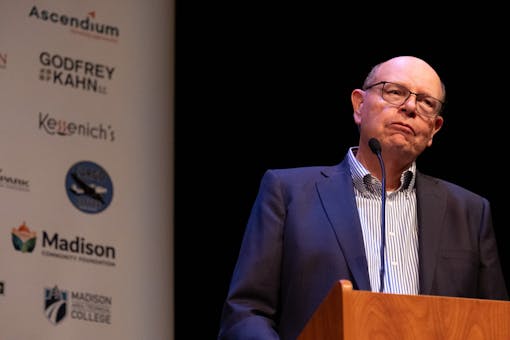Members of the Madison community, including Chancellor Jennifer Mnookin, emphasized the necessity and crucial role of free speech and Diversity, Equity & Inclusion (DEI) on campus in a panel Tuesday evening amid student discontent with the University of Wisconsin-Madison’s free speech policies.
The event, hosted by The Cap Times as part of its weeklong Idea Fest, put free speech center stage as UW-Madison administration continues to face student criticism of their policies. The discussion, which also included UW-Madison Law School Dean Daniel Tokaji, former Madison Mayor Paul Soglin and moderator David Maraniss, explored the debate between ensuring campus safety and the limits of free speech.

Paul Fanlund, publisher at The Cap Times, introduces the panelists prior to the event.
Mnookin said UW-Madison “wants to be a place that supports free inquiry” for faculty and students.
“[It should be] free from influence from me, influence from external forces, from legislators, from parents,” she said.
At the same time, UW-Madison is trying to navigate threats from the Republican-controlled state Legislature, members of which are staunchly opposed to DEI. Assembly Speaker Robin Vos, R-Rochester, said UW System DEI programs are “liberal indoctrination.”
This tension is embodied in the ongoing debate surrounding UW System DEI offices. Vos has pledged to deny system employees pay raises and future funds if the offices aren’t cut.
The university maintains it will not cut DEI programs but instead potentially expand its “umbrella” of DEI programs.
“As a function of the $32 million budget cut, we have not taken any actions focused on DEI and actually, really, we’re looking at ways we can grow what we can do under our diversity umbrella” Mnookin told The Daily Cardinal after the panel.
Free speech a “never-ending battle,” panelists say
Soglin, a student activist in the 1960s who was beaten by the police during Vietnam War protests, said the current free speech landscape is “worse than ever” alongside multiple levels of censorship across academia.
He became the lead plaintiff in a free speech lawsuit against UW-Madison in 1969. Though speech can be disturbing, Soglin said there can’t be a strict ideological definition on what constitutes permissible speech.
“Hate speech has to be called out, but you cannot maintain free speech for all people if we’re going to have some ideological definition,” Soglin told the Cardinal after the panel. “There are certain types of speech that offend us and therefore, as hateful as it is, unfortunately it has to be allowed in our society.”
During the event, Soglin referred to the “chilling effect,” — a “critical element” of his free speech lawsuit that challenged UW-Madison’s imposition of overly broad restrictions on students’ free expression.
“Nowadays, that chilling effect comes from so many different sources,” Soglin said, explaining that the effect can come from students making life “miserable and even dangerous” for a visiting campus speaker, pointing to incidents in Boston and California.
“It can come from a legislature, and we know that full well here in Wisconsin over the last several decades of vengeful legislators [saying] ‘we're gonna cut your budget if you do not [comply],’” Soglin added.
As Mnookin laughed, Soglin dryly asked, “Would you know anything about that?”
“I don’t know of which you speak,” Mnookin joked.

Jennifer Mnookin, chancellor at UW-Madison, listens during the panel.
Belonging and identity
A key criticism of the administration’s free speech policy is that it fails students of color — a significant minority on campus — who have said they do not feel safe or listened to.
These concerns were brought to the forefront last spring when a video of a white UW-Madison student saying violent racial slurs rocked campus and brought renewed attention to the university’s handling of student speech and disciplinary action.
The incident — which Maraniss called “the elephant in the room” — became one of the panel’s focal points when he asked Mnookin how she had responded to the video’s release and the subsequent campus uproar.
While acknowledging the video's blatant racism and the pain it produced on campus, Mnookin underscored the video as still being protected by free speech.
“The fact that this was hateful and racist didn’t mean that it wasn’t protected,” Mnookin said. “We can work to create a culture of belonging, but we cannot legally take punitive action against the speaker in an instance like that.”
Tokaji highlighted a supposedly shifting student perception of free speech, especially as students today haven’t lived through historic events like South African apartheid and the Vietnam War.
“Our students today don’t have the context that many of us older folks have with respect to freedom of speech, and its centrality for those of us who care about achieving progressive social change,” Tokaji explained. “When they hear about freedom of speech, it's often our telling them why we can't truthfully do what they want us to do.”
Mnookin said on-campus and in a “viral” climate, “some of the same folks who are defending free speech rights in one arena think that somebody else shouldn't be allowed to speak at all because their speech causes harm.”
“There’s a lot of people who say, when confronted with speech they find troubling, offensive, wrongful or hateful, ‘That’s not free speech. That’s hate speech,’” Mnookin said.
Hate speech and free speech are not mutually exclusive under the First Amendment, though, Mnookin said.
“It's one thing to admit a diverse group of students who represent a wide range of identities, backgrounds and perspectives, identities, backgrounds and perspectives,” Tokaji said. “It is quite another to make them all feel welcome here.”
Gavin Escott is the campus news editor for the Daily Cardinal. He has covered protests, breaking news and written in-depth on Wisconsin politics and higher education. He is the former producer of the Cardinal Call podcast. Follow him on X at @gav_escott.






